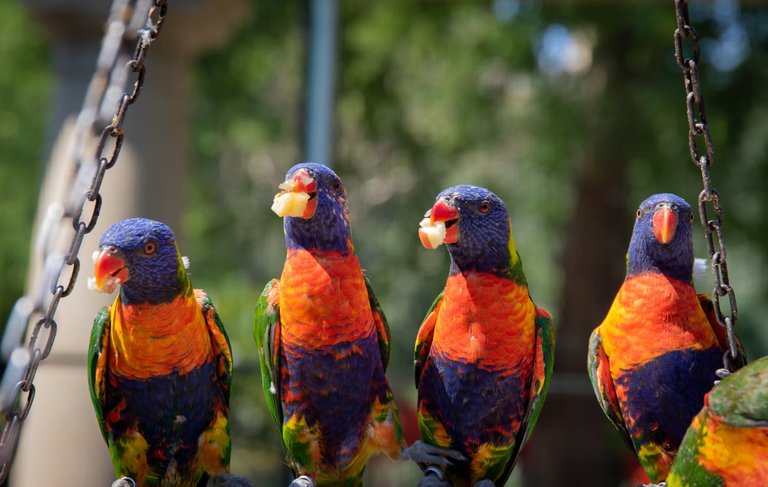Psittacosis is an infectious disease that can spread from an infected bird to humans, there are several bird types in the parrot family, including; macaws, budgerigars, parrots, and cocktails. It is also possible for domestic turkeys and pigeons to infect people, it is often caused by a bacteria called Chlamydia psittaci.

pexels.com
This disease is a zoonotic disease that pet owners can occasionally pick up, pet store workers, zoo employees, and even veterinarians, it can also be rarely found in slaughterhouse workers, and farmers who process poultry which could either be chickens, ducks, and especially turkeys. It is a rare disease in the United States with lesser than 10 cases on a yearly basis, which has been existing since 2010.
Psittacosis is spread through inhaling the dust of dried droppings from birdcages or the handling of infected birds found in slaughterhouses, these waste materials in birdcages may remain infectious for several weeks.
The symptoms of psittacosis are fever, chills, muscle pains, headaches, cough, and some forms of breathing difficulty or pneumonia. If this infection is left untreated, it could turn out very severe and even lead to death in some cases, especially in older people. Some people may experience some flu-like illness or show any symptom at all, the bird's symptoms include; eye and nose discharge, ruffled appearance, poor appetite, green or yellow-green droppings, and diarrhea. In some cases, birds could die from the disease, some birds could shed the bacteria and exhibit just mild or no symptoms. The period when a person is exposed to the infection until the time when the symptoms begin to appear would range from 5-19 days, in the same vein, longer periods have been reported.

pexels.com
Asides from getting exposed to the urine of an infected bird or to a respiratory section, other sources like a mouth to beak contact or a bite from an infected bird can also cause the spread of the infection from bird to human. Psittacosis on its own is a lung disease primarily but can get to affect different organs. There are reports that show that liver inflammation, the lining of the heart cavity, heart muscle, and the brain can also occur with the infection. High cases of this infection can lead to death.
How to control Psittacosis.
Preventive measures can be taken to limit the infection of psittacosis, this includes appropriate feeding of birds, avoiding overcrowding, and providing proper ventilation using HEPA (High-efficiency particulate air) filters for the reduction of the spread of contaminated air. Cleaning cages on a daily basis is of great essence, pet owners would be able to control pet infections by adding antibiotics to their feed, but this should however not take the place of subsequent testing and appropriate treatment when required. Once signs of psittacosis are noticed, infected birds have to be kept in isolation and proper ventilation of the place must be procured, everyone who needs to take care of an infected bird should put on protective clothing including gloves, surgical caps (should be disposable), eyewear, a properly fitted respirator.
Also, one must avoid dry sweeping, brushing, or vacuuming while cleaning cages, waste materials need to be consistently removed from the cage after the material has been moistened with disinfectant. Always double bag or burn waste ready for disposal, discard those items that cannot be appropriately cleaned, and avoid mixing disinfectants with other products.
To get an accurate diagnosis of the disease, a doctor needs to be properly informed about previous exposure of humans to birds. Then, if the birds are suspected to be infected with Chlamydia psittaci, the use of laboratory examinations could be used for the identification of the organism and for the detection of the signs of infection.
In treating psittacosis, the doctor would prescribe tetracycline antibiotics, but this is not the only effective form of medication available as Quinolone antibiotics and macrolides are other effective medications, within one to four days, the fever would subside, but more medications would be prescribed for more severe cases.
This disease is not very common among children, but when it happens to children, it is associated with challenges during the treatment procedure. Children are usually not able to take quinolone medications, so azithromycin is usually prescribed for children whose age is less than 8 years, and doxycycline for older children, almost all children who have it recover. Getting treated for psittacosis doesn't grant immunity, what this means is that, when a person gets exposed again to an infected bird, sickness is not an overruled option and there is no vaccine against the disease. Infected humans can get help for themselves from a doctor, pet owners whose pets are infected can get help from a veterinary doctor, and even communicable disease prevention.
Transmission of a bacteria from one person to another is not impossible, although very rare, it can still happen when an uninfected person gets exposed to the aerosolized droplets from another human who is experiencing paroxysmal, a sudden or a very forceful cough during acute illness.
Conclusion.
Psittacosis is a type of lung infection caused by the bacterium Chlamydia psittaci, it is usually carried by birds of the parrot family, it is definitely a zoonotic disease and it can be treated with simple antibiotics, but there are human cases associated with some complications. Pets can be treated on time with the help of a good veterinary doctor and it can be prevented with proper care and hygiene of the pet.
References.
https://www.ccohs.ca/oshanswers/diseases/psittacosis.html
https://www.britannica.com/science/psittacosis
https://www.ncbi.nlm.nih.gov/books/NBK538305/
https://www.webmd.com/a-to-z-guides/what-is-psittacosis
https://www.health.ny.gov/diseases/communicable/psittacosis/fact_sheet.htm
https://www.cdc.gov/pneumonia/atypical/psittacosis/index.html
https://www.cdc.gov/pneumonia/atypical/psittacosis/about/signs-symptoms.html
I was about to study Psittacosis when I saw your post. I am glad to have gotten an understanding of it, it will help me in my further study. Thanks for creating this post.
I am excited I was able to help out, thanks for reading.
Thanks for your contribution to the STEMsocial community. Feel free to join us on discord to get to know the rest of us!
Please consider delegating to the @stemsocial account (85% of the curation rewards are returned).
Thanks for including @stemsocial as a beneficiary, which gives you stronger support.
When we learnt Chlamydia, much light wasn't thrown on Chlamydia Psttaci or Psittacosis.
Thank you for this @futurekr
I am happy you found it helpful, cheers to more time of learning more from one another